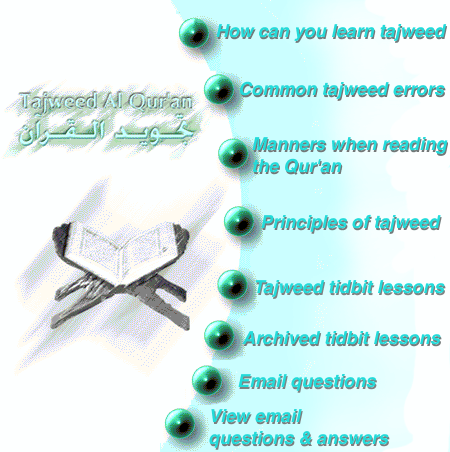Hamzah
Al-Wasl

Lesson
2
We
stated last lesson, which is now in the tidbit archives, that the hamzah
al-wasl is an extra hamzah at the beginning of a word, used to connect us to
the first letter of the word, which has a sukoon. The
Arabs, as stated in the introduction, only start a word or phrase with a
voweled letter. The symbol for a
hamzah wasl is:
 ,
which is an alif with a small letter
,
which is an alif with a small letter
 over
it.
over
it.
The
hamzah wasl is not to be confused with a regular letter hamzah, called hamzah
qata’,
 ,
which can be at the beginning, middle, or end of a word.
The regular letter hamzah or
,
which can be at the beginning, middle, or end of a word.
The regular letter hamzah or
 looks
like the head of the letter
looks
like the head of the letter
 , and can
be written on an alif as in :
, and can
be written on an alif as in :
 ,
or a
,
or a
 as
in:
as
in:
 ,
or on a
,
or on a
 :
:
 .
It can also be written on a “tooth” or stick in the middle of a
word:
.
It can also be written on a “tooth” or stick in the middle of a
word:
 ,
or just in the air with no letter or stick to “lean” on:
,
or just in the air with no letter or stick to “lean” on:
 .
These are all hamzah qata’, and are pronounced as a hamzah with the
accompanying vowel written over
or under the hamzah.
.
These are all hamzah qata’, and are pronounced as a hamzah with the
accompanying vowel written over
or under the hamzah.
The
hamzah wasl on the other hand has no vowel written over it, is only at the
beginning of a word, and is only written over an alif, with the small
 over
it (
over
it (
 ).
).
For
those using the copy of the mus-haf prevalent in Pakistan and India, there is
a different way to determine hamzah wasl, from hamzah qata’, and from an
alif. These copies of the mus-haf do not write in the symbol for
the hamzah on an alif, nor do they write in the symbol for the hamzah wasl.
The way to determine then whether the symbol
 at
the beginning of a word is a regular hamzah qata’, or hamzah wasl is that if
there is a vowel written over or under it, it is a hamzah qata’ : as in
at
the beginning of a word is a regular hamzah qata’, or hamzah wasl is that if
there is a vowel written over or under it, it is a hamzah qata’ : as in
 .
.
If there is no vowel on it, it is then a hamzah wasl, as in the
first letter of:
 .
The real true alif ( which is an alif preceded by a fat-h) can never
start a word, since it is a saakin letter.
.
The real true alif ( which is an alif preceded by a fat-h) can never
start a word, since it is a saakin letter.
 in
verbs
in
verbs
The hamzah wasl can be
found beginning some past tense and command verbs. When the past tense or command form of a verb has a sukoon for
the first letter, whether it is a simple sukoon or a shaddah, a hamzah wasl is
needed to start out the verb. The
hamzah wasl is never found at the beginning of a present tense verb.
There are four
categories of verbs, each category depends on the number of letters that make
up the essence of the verb. There
are three letter
 basic
verbs, four letter
basic
verbs, four letter
 , five
letter
, five
letter
 , and
six letter
, and
six letter
 verbs.
A brief introduction to grammar terms can be found in the archived
tidbit lessons.
verbs.
A brief introduction to grammar terms can be found in the archived
tidbit lessons.
 can
start past tense verbs with five and six letter verbs.
can
start past tense verbs with five and six letter verbs.
Some examples of five
letter base past tense verbs that start with hamzah wasl are all three
underlined verbs in:

Another
example is:

Examples of hamzah
al-wasl in a past tense verb with a six letter base are the underlined words
in:


Hamzah al-wasl can enter
the command form of verbs in the three letter, five letter, and six letter
base verbs.
The
following aayaat have examples of
hamzah al-wasl in the command form of the three letter root verb:


Hamzah
Wasl examples in the command form of the five letter verb:


Hamzah
wasl examples in the command form of the six letter verbs


It
is clear from the preceding that the hamzah al-wasl does NOT enter into
the following verbs:
1.
The present tense verb at all.
2.
The four letter root verb at all.
3.
The past tense three letter root.
The
following table explains which type of regular verbs the
 can
enter:
can
enter:

Next lesson, insha’
Allah, we will describe the most important part of the hamzah wasl lessons:
how to determine which vowel to start the hamzah al-wasl with in a verb.
